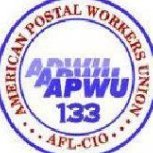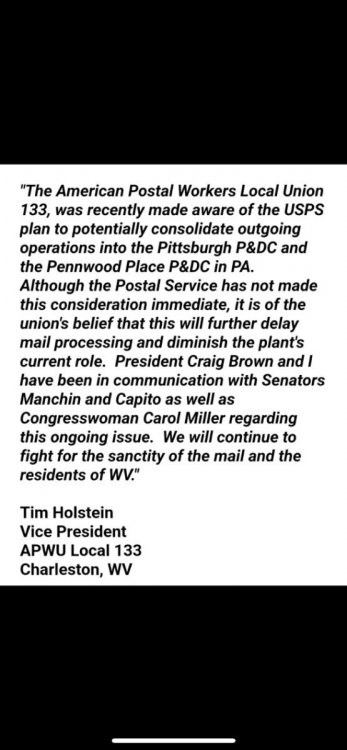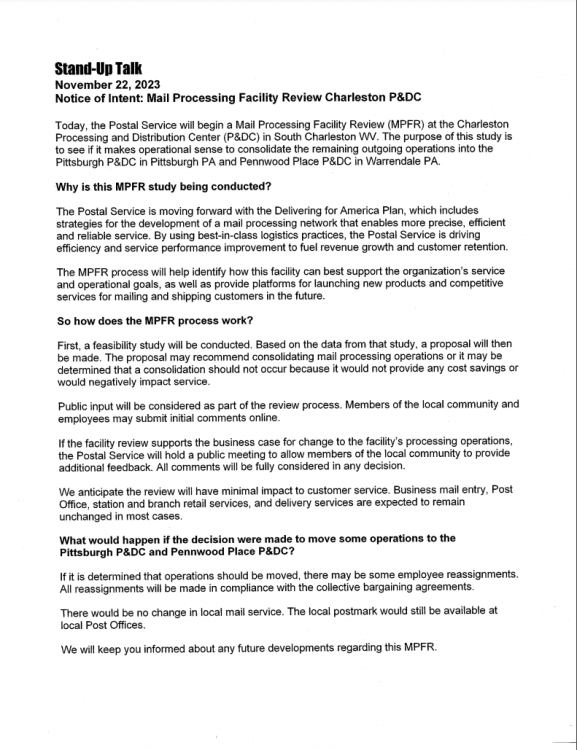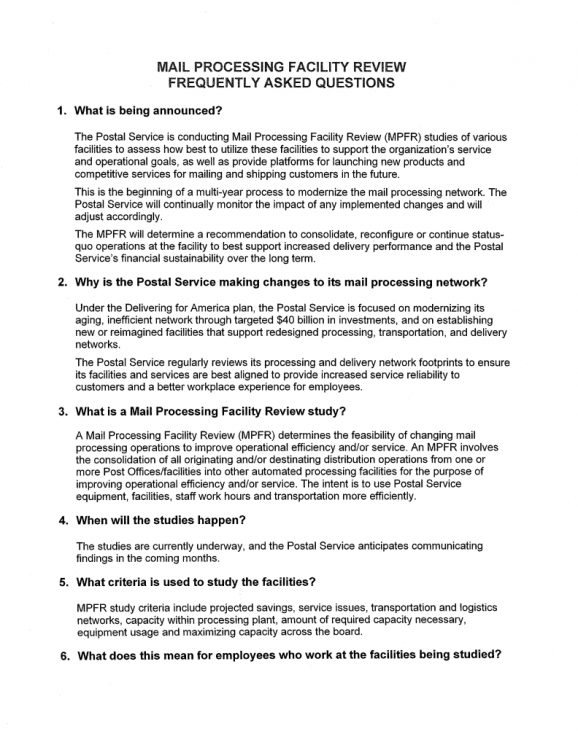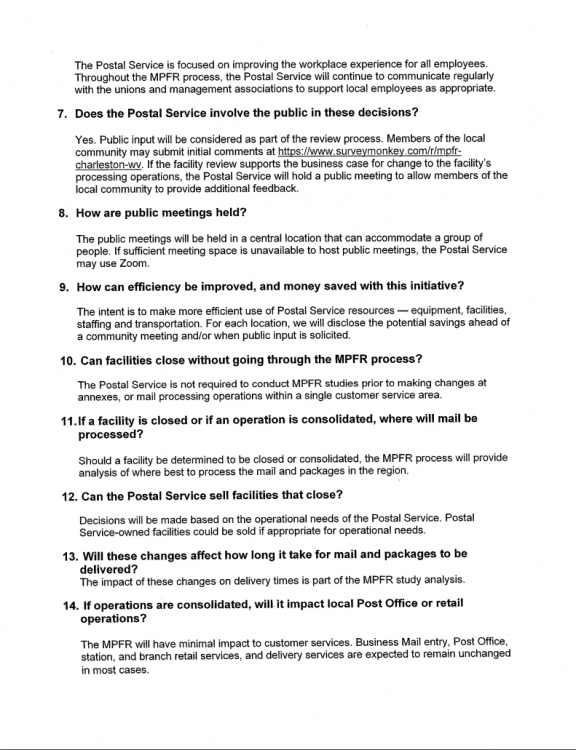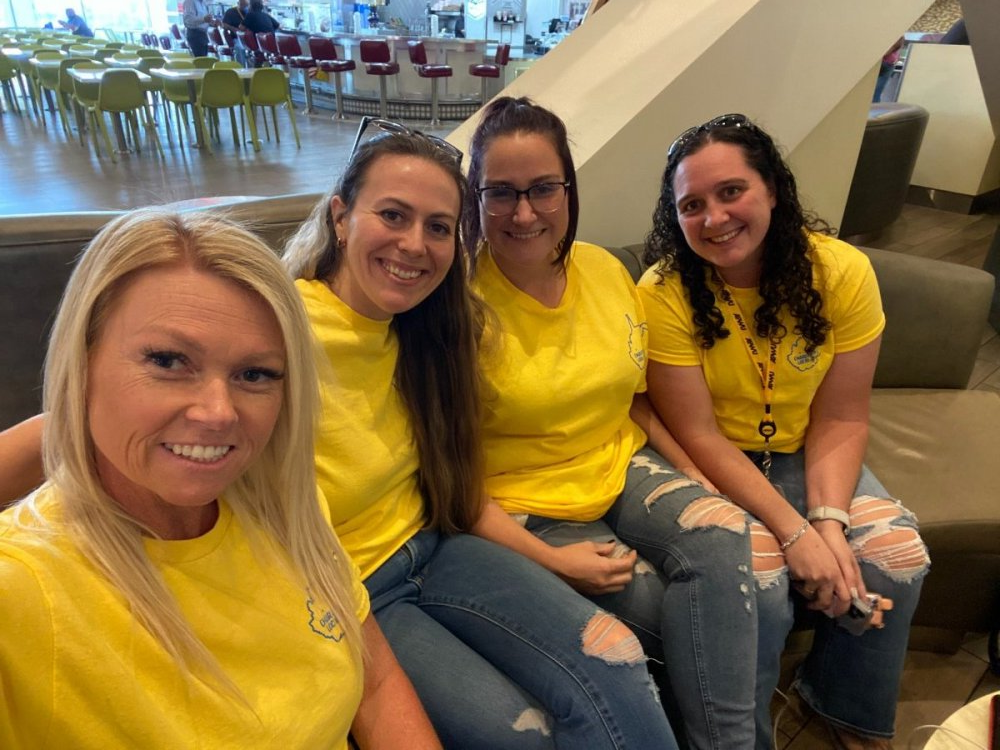-
Posts
147 -
Joined
-
Last visited
Content Type
Profiles
Forums
Events
Everything posted by Apwu133
-
Contact your legislators to oppose the proposed changes at the USPS Charleston P&DC The Honorable Jim Justice, Governor Office of the Governor State Capitol State Building One 1900 Kanawha Boulevard, East Charleston, WV 25305 (304) 558-2000 https://appengine.egov.com/apps/wv/governor/contactus The Honorable Joe Manchin, Senator 900 Pennsylvania Avenue, Ste. 629 Charleston, WV 25302 (304) 342-5855 (202) 202-224-3954 https://www.manchin.senate.gov/contact-joe/email-joe The Honorable Shelley Moore Capito, Senator 500 Virginia Street East, Suite 950 Charleston, WV 25301 (304) 347-5372 (202) 224-6472 https://www.capito.senate.gov/contact/contact-my-office The Honorable Carol Miller, Congresswoman 33 Tennessee Avenue Charleston, WV 25302 (681) 945-6556 (202) 225-3452 https://millerforms.house.gov/contact/ Amy Shuler Goodwin, Mayor Charleston 501 Virginia Street East Charleston, WV 25301 (304) 348-8174 mayorsoffice@cityofcharleston.org Frank Mullens, Mayor South Charleston 401 D Street South Charleston, WV 25303 (304) 744-5301 scmayor@cityofsouthcharleston.com
-
Help Save Jobs!! Help our APWU 133 brothers and sisters who work for the U.S. Postal Service in West Virginia! Follow this link to oppose the proposed changes at the USPS Charleston P&DC mail processing facility, which could cost our area hundreds of jobs. This survey is only for a limited time!! We will provide updates ASAP.
-
The following email was sent to the WV AFL-CIO President Joshua Sword by state and local Legislative Director Bob Redman. President Sword later responded that the AFL-CIO are with us 100% Good Evening, President Sword, On Wednesday, November 22, the day before Thanksgiving, employees of the Charleston WV, USPS Processing and Distribution Center were given a stand-up talk by their supervisors. Management indicated that two facilities in the Pennsylvania area may be processing mail, otherwise dedicated to Charleston. This will affect over 500 union AFL-CIO members, and more than likely delay the delivery of mail. Currently, a study is being conducted by the USPS in conjunction with Postmaster General Louis Dejoy’s Delivering for America ten-year plan. The plan is to eliminate Processing and Distribution Centers and merge into Regional Sorting Processing Centers, with Pittsburgh as one of the new centers. The Charleston facility will be downgraded to a Logistics and Distribution Center (LDC). LDCs provide mail processing and distribution to local Post Offices as well as other smaller distribution facilities and are equipped with fixed mechanization for mail processing. However, many mail processing machines will be removed, including several already taken out of the Charleston P&DC in the past six months. United States Senator Gary Peters, D-Mich., who chairs the Senate committee with oversight of the Postal Service, said in a statement he was "concerned that several of the initiatives in this plan will harm service for folks across the country who rely on the Postal Service for prescription drugs, financial documents, running their small businesses, and more." "Cuts to service standards for first-class mail, limiting hours at local post offices, and making it more difficult for people to access postal products would adversely impact USPS customers across the nation, including in rural and underserved communities." Peters added. The P&DC started processing mail from its Charleston location in September 1993. Charleston started assumed mail from Huntington, Beckley, Parkersburg, Clarksburg, Lewisburg, and Princeton, West Virginia in addition to Ashland and Pikeville Kentucky within the past decade after their closures. This potential job loss will not only affect union employees and their families, but also generate a possible economic decline in the local economy. Brother Sword, we need your help. Please stand in solidarity with the members of APWU Local 133 and pledge your support. I will keep you updated with our fight as well as any local events to combat this. Bob Redman Legislative Director APWU 133 Charleston WV
-
View Facility Review Questions/Answers FAQs Documents Study Name Status Supporting Documentation Augusta, GA Decision to Proceed Final MPFR (Redacted) PDF Public Comment Summary RTF Initial Findings RTF Notice of Public Meeting RTF Notice of Intent 7/12/23 RTF Bismarck, ND Public Input Notice of Public Meeting RTF Notice of Intent 11/8/23 RTF Buffalo, NY Notice of Intent Notice of Intent 11/22/23 RTF Cheyenne, WY Public Input Notice of Public Meeting RTF Notice of Intent 11/8/23 RTF Charleston, WV Notice of Intent Notice of Intent 11/22/23 RTF Chattanooga, TN Public Input Initial Findings RTF Notice of Public Meeting RTF Notice of Intent 10/25/23 RTF Columbia, MO Public Input Initial Findings RTF Notice of Public Meeting RTF Notice of Intent 10/18/23 RTF Dakota Central, SD Public Input Notice of Public Meeting RTF Notice of Intent 11/8/23 RTF Eastern Maine, ME Notice of Intent Notice of Intent 11/22/23 RTF El Paso, TX Public Input Initial Findings RTF Notice of Public Meeting RTF Notice of Intent 10/25/23 RTF Eugene, OR Decision to Proceed Final MPFR (Redacted) PDF Public Comment Summary RTF Initial Findings RTF Notice of Public Meeting RTF Notice of Intent 7/12/23 RTF Fort Myers, FL Notice of Intent Notice of Intent 11/22/23 RTF Fort Wayne, IN Public Input Initial Findings RTF Notice of Public Meeting RTF Notice of Intent 10/25/23 RTF Grand Forks, ND Public Input Notice of Public Meeting RTF Notice of Intent 11/8/23 RTF Greenville, SC In Review Initial Findings RTF Notice of Public Meeting RTF Notice of Intent 9/27/23 RTF Knoxville, TN Public Input Initial Findings RTF Notice of Public Meeting RTF Notice of Intent 10/25/23 RTF Lehigh Valley, PA Public Input Initial Findings RTF Notice of Public Meeting RTF Notice of Intent 10/18/23 RTF Lubbock, TX Notice of Intent Notice of Intent 11/22/23 RTF Macon, GA Decision to Proceed Final MPFR (Redacted) PDF Public Comment Summary RTF Initial Findings RTF Notice of Public Meeting RTF Notice of Intent 7/12/23 RTF Medford, OR Decision to Proceed Final MPFR (Redacted) PDF Public Comment Summary RTF Initial Findings RTF Notice of Public Meeting RTF Notice of Intent 7/12/23 RTF Minneapolis, MN In Review Initial Findings RTF Notice of Public Meeting RTF Notice of Intent 9/27/23 RTF NW Arkansas, AR Public Input Notice of Public Meeting RTF Notice of Intent 11/8/23 RTF Provo, UT In Review Initial Findings RTF Notice of Public Meeting RTF Notice of Intent 9/27/23 RTF South Suburban, IL In Review Initial Findings RTF Notice of Public Meeting RTF Notice of Intent 9/27/23 RTF Tacoma, WA Public Input Initial Findings RTF Notice of Public Meeting RTF Notice of Intent 10/25/23 RTF Tallahassee, FL Public Input Initial Findings RTF Notice of Public Meeting RTF Notice of Intent 10/18/23 RTF Trenton, NJ In Review Initial Findings RTF Notice of Public Meeting RTF Notice of Intent 9/27/23 RTF Wenatchee, WA Public Input Initial Findings RTF Notice of Public Meeting RTF Notice of Intent 10/25/23 RTF Wilmington, DE Public Input Initial Findings RTF Notice of Public Meeting RTF Notice of Intent 10/18/23 RTF U.S. Postal Service links
-
The Federal Retirement Fairness Act (H.R. 5995) was reintroduced on October 19 by Representatives Derek Kilmer (D-WA-06), Don Bacon (R-NE-02), Gerry Connolly (D-VA-11), and David Valadao (R-CA-22). The Federal Retirement Fairness Act (FRFA) would allow eligible employees who converted from temporary to career positions to “buy back” time towards their retirement. Prior to 1989, postal workers who began as non-career employees were able to make additional contributions to their retirement benefits to make up for time lost when they were not eligible for these benefits. This allowed eligible employees to retire on time and with full benefits. This also created parity between temporary and career employees, ensuring they had equal access to retirement benefits. Unfortunately, this authority expired and was never reinstituted. “The APWU is in strong support of the Federal Retirement Fairness Act and applauds the bipartisan leadership on this critical issue,” said Mark Dimondstein, President, APWU. “This legislation would allow more than 100,000 postal workers who converted from temporary to career positions to retire on time with their full benefits. Regardless of an employee’s initial hiring status, all postal and federal employees should have access to the benefits they have earned for their dedicated work.” LINK HERE TO THE STATUS OF THE BILL H.R.5995 - 118th Congress (2023-2024): Federal Retirement Fairness Act | Congress.gov | Library of Congress
-
Members, please take a moment to share and fill out the survey below pertaining to the proposed changes at the USPS Charleston P&DC mail processing facility. These proposed changes will negatively affect the state of West Virginia. Send the link to as many family members and friends as you can, so that the public's voice may be heard as well. This survey is only for a limited time, so don't delay. https://www.surveymonkey.com/r/mpfr-charleston-wv
-
RELEASE Notice of Intent - Charleston WV_2023-11-22.docx Mail Processing Facility Review (MPFR) Notice of Intent to Conduct Mail Processing Facility Review Charleston P&DC in South Charleston WV to Pittsburgh P&DC in Pittsburgh PA and Pennwood Place P&DC in Warrendale PA 11/22/2023 As part of its 10-year strategic Delivering for America plan to modernize the nation’s aging postal network, the U.S. Postal Service is conducting a Mail Processing Facility Review (MPFR) of its processing operations at the Charleston Processing & Distribution Center (P&DC) in South Charleston WV. The MPFR will assess how this facility can best support the Postal Service’s service and operational goals and provide a platform to launch new products and competitive services for mailing and shipping customers in the future. The Postal Service will also evaluate if efficiency could be increased by transferring some mail processing operations currently performed at the Charleston P&DC to the Pittsburgh P&DC and the Pennwood Place P&DC. The MPFR process is expected to have minimal impact to customer service. Business mail entry, Post Office, station and branch retail services, and delivery services are expected to remain unchanged in most cases. Public input will be considered as part of the review process. Members of the local community may submit comments at https://www.surveymonkey.com/r/mpfr-charleston-wv. If the facility review supports the business case for change to the facility’s processing operations, Postal Service representatives will hold a public meeting to allow members of the local community to provide additional feedback. NOTICE OF INTENT - Charleston WV_2023-11-22.docx
-
In accordance with Article 8, Sections 4 and 5 of the APWU Collective Bargaining Agreement, penalty overtime rules are not applicable for a consecutive four-week period each year during December. The "Penalty Overtime Exclusion" period for calendar year 2023 will begin Pay Period 26-2023, Week 1 (December 2, 2023) and end Pay Period 01-2024, Week 2 (December 29, 2023). Penalty Overtime Exclusion Period December 2 - 29, 2023
-
NEW 2024 NETWORK! Choose between two smart medical plans that feature a nationwide UnitedHealthcare network of 1.7+ million providers; 7,000 hospitals and healthcare facilities; and no referrals are needed. Premiums for Tribal employees are shown under the monthly premium rate column. The amount shown is the maximum you will pay. Your Tribal employer may choose to contribute a higher portion of your premium. Please contact your Tribal Benefits Officer for exact rates. High Option With low copays and low deductibles, the High Option is a premier plan in the Federal Employees Health Benefits (FEHB) Program. 100% Coverage for in-network services Preventative care and screenings Lab tests (covered blood work performed at LabCorps and Quest Diagnostics) Maternity care and support Breast cancer screenings Tobacco cessation program Accidental injury outpatient services within 72 hours Generic oral diabetes medications Visits to a registered dietician/nutritionist No primary care provider (PCP) requirement Freedom to use network and out-of-network providers Consumer Driven Option The Consumer Driven Option is a proactive alternative to conventional healthcare that can save you money. 100% Coverage for in-network services Your own Personal Care Account (PCA) helps pay for medical expenses Preventative care and screenings Maternity care and support Breast cancer screenings Tobacco cessation program No primary care provider (PCP) requirement Freedom to use network and out-of-network providers HEALTH AND WELLNESS PROGRAMS One Pass Gym Discount Maven United Hearing One Pass Select is a fitness and well-being subscription-based network that provides access to over 16,000 gyms and studios Maven provides free, 24/7 virtual support for pregnancy, postpartum and returning to work after parental leave. United Hearing members can access over 2,000 name-brand models and styles of hearing aids at significant savings through UnitedHealthcare Hearing. 2024 HIGH OPTION PREMIUM RATES Low copays: $10 for 24/7 virtual visits; $25 for office visits, including specialists; $30 for urgent care; $10 for retail non-specialty tier 1 drugs. Self Only enrollment code 471 Bi-weekly $124.52 Monthly $269.79 Self Plus One enrollment code 473 Bi-weekly $244.95 Monthly $530.73 Self & Family enrollment code 472 Bi-weekly $304.05 Monthly $658.77 2024 CONSUMER DRIVEN OPTION - PREMIUM RATES Your own Personal Care Account (PCA) helps pay for medical expenses. In January, the Health Plan funds a PCA members can use for covered medical services. Members are covered 100% until the PCA is exhausted. The Plan funds the PCA at $1,200 for Self Only and $2,400 for Self Plus One and Self & Family. Self Only enrollment code 474 Bi-weekly $76.78 Monthly $166.36 Self Plus One enrollment code 476 Bi-weekly $166.88 Monthly $361.58 Self & Family enrollment code 475 Bi-weekly $182.05 Monthly $394.45 APWU SPECIAL RATES BI-WEEKLY Special rates (charged bi-weekly) apply to APWU Career Bargaining Unit Employees for the Consumer Driven Option. Self Only enrollment code 474 APWU career less than 1 year in FEHB $76.78 PSE $76.78 APWU career more then 1 year in FEHB $15.36 Self Plus One enrollment code 476 APWU career less than 1 year in FEHB $166.88 PSE $166.88 APWU career more then 1 year in FEHB $33.38 Self & Family enrollment code 475 APWU career less than 1 year in FEHB $182.05 PSE $182.05 APWU career more then 1 year in FEHB $36.41 OPEN SEASON HOTLINE: 1-(800) PIC-APWU or 1-(800) 742-2798 (hotline opens November 13) email: virtualopenseason@apwuhp.com (response within 48 hours) for more information, visit: www.apwuhp.com Disclaimer: This is a summary of benefits and features offered by the APWU Health Plan. All benefits are subject to the definitions, limitations, and exclusions set forth in the Plan's Brochure (RI 71-004).
-
Paula Barker-Harless Gary Shorter Glenn Wilson Susan Swiney Drew Myers Rita Jackson Art Underwood
-
The Federal Retirement Fairness Act (H.R. 5995) was reintroduced on October 19 by Representatives Derek Kilmer (D-WA-06), Don Bacon (R-NE-02), Gerry Connolly (D-VA-11), and David Valadao (R-CA-22). The Federal Retirement Fairness Act (FRFA) would allow eligible employees who converted from temporary to career positions to “buy back” time towards their retirement. Prior to 1989, postal workers who began as non-career employees were able to make additional contributions to their retirement benefits to make up for time lost when they were not eligible for these benefits. This allowed eligible employees to retire on time and with full benefits. This also created parity between temporary and career employees, ensuring they had equal access to retirement benefits. Unfortunately, this authority expired and was never reinstituted. “The APWU is in strong support of the Federal Retirement Fairness Act and applauds the bipartisan leadership on this critical issue,” said Mark Dimondstein, President, APWU. “This legislation would allow more than 100,000 postal workers who converted from temporary to career positions to retire on time with their full benefits. Regardless of an employee’s initial hiring status, all postal and federal employees should have access to the benefits they have earned for their dedicated work.”
-
Click here to download a PDF version. Visit our website at www.apwuhp.com. More Open Season information is coming soon.
-
November 13 - December 11 Health Benefit Officers, Welcome to our 2023 APWU Health Plan Virtual Open Season Health Fairs! We wanted to give your employees an opportunity to meet with APWU Health Plan staff virtually and learn about our benefits. Postal, Federal, and Retirees who are eligible for the Federal Employee Health Benefits Program can access and attend our virtual health fairs safely online. During Open Season, every Tuesday, from 12-2pm EST our Health Plan staff will be online to answer questions and discuss plan features. Please forward this email to your employees so that they can participate. Click on the register now to confirm your attendance. Once registered you will get an email confirmation with a GoToWebinar link and dial-in information. The day before the virtual health fair date you selected, you will receive an email reminder with the dial-in information and instructions. Register Now! for any of our Virtual Health Fairs. Welcome to Open Season 2023!
-
It is no secret that the Postal Service is making changes. One constant that I have experienced throughout my career with the USPS is that the Postal Service evolves and changes. I am a fourth-generation postal employee. When I was a young boy in the early 1970s, I have memories of my father taking me to the Post Office in Salt Lake City and seeing nothing but clerks sorting mail by hand in letter cases. Today, that building is full of automated machines. Automation has changed the Postal Service over the decades. Today, the Postal Service is in a state of change. Mail type is shifting from letters and flats to parcels. Overall, all mail volume is down. But no matter the shift in mail type or decrease in volume, the public deserves a Postal Service that meets its universal service obligation, delivers mail on time, and functions as a true public service. The current Postmaster General (PMG) is making decisions that are putting APWU-represented employees in a state of flux. He believes that his plan will increase volume (at least parcel volume), speed up parcel delivery (and therefore speed up all mail delivery), and put the USPS on a sounder financial footing. He is calling his plan “Network Modernization.” As the PMG continues to push these changes, the APWU continues to demand that our contract is followed, that the Postal Service be transparent, and that the Postal Service allow the public to have input, and more. As the PMG changes are implemented, the Postal Service has sought to excess employees from their installations to other offices. Your Regional Coordinators have led APWU efforts to minimize the impact and disruptions on those who could be excessed. Even in the face of postal management that uses tactics that at best can be described as inaccurate, Regional Coordinators have reduced the numbers of employees excessed overall. They prepare for each event and work relentlessly on your behalf. We know that the Postal Service is not being fully transparent about their plans. Even though they do meet with the APWU at the national level regularly, they refuse to provide the most basic information we request. We have filed charges with the National Labor Relations Board (NLRB) to compel them to provide the information we have demanded. For some of these network changes, the Postal Service is required to inform the public and allow their input on changes to the network. The Postal Service must follow guidelines outlined in the PO-408 manual. We have insisted that the Postal Service follow this manual. Of course, management pushed back against our demands. The Postal Service did eventually capitulate and agree that the PO-408 would be followed. But rather than follow the process, they chose to change the rules and make significant changes to the PO-408. After extensive review and coordination with our legal counsel, we have filed a national dispute on these changes. Finally, it is important that your national officers get out and see these new facility types, talk to the workers at these new facilities, and learn all we can about the new facilities. Recently, we visited with the new Sortation and Delivery Center (S&DC) in Annapolis, MD. This was the first of our visits to the S&DCs that are currently operating around the country. National officers and headquarters staff are currently planning more visits to both the S&DCs and the Regional Processing and Distribution Centers as they come online. Your union officers will continue to work hard during these changing times to protect your rights under the CBA, and to take the fight to the streets with our public allies to protect our right to an effective and efficient Postal Service.
-
The Federal Government established the Federal Employees' Group Life Insurance (FEGLI) Program on August 29, 1954. It is the largest group life insurance program in the world, covering over 4 million Federal employees and retirees, as well as many of their family members. Most employees are eligible for FEGLI coverage. FEGLI provides group term life insurance. As such, it does not build up any cash value or paid-up value. It consists of Basic life insurance coverage and three options. In most cases, if you are a new Federal employee, you are automatically covered by Basic life insurance and your payroll office deducts premiums from your paycheck unless you waive the coverage. In addition to the Basic, there are three forms of Optional insurance you can elect. You must have Basic insurance in order to elect any of the options. Unlike Basic, enrollment in Optional insurance is not automatic -- you must take action to elect the options. The cost of Basic insurance is shared between you and the Government. You pay 2/3 of the total cost and the Government pays 1/3. Your age does not affect the cost of Basic insurance. You pay the full cost of Optional insurance, and the cost depends on your age. The Office of Federal Employees' Group Life Insurance (OFEGLI), which is a private entity that has a contract with the Federal Government, processes and pays claims under the FEGLI Program More Information on USPS Life Insurance
-
Your COLA is here! Today career USPS workers covered by the APWU-USPS contract are seeing a paycheck with more money today. Whether it’s your car payment, gas to get to work, or maybe extra food in the pantry - this bump is because members said “we need wages that respect our work.” We have to tell the story that this increase is thanks to members fighting at the bargaining table. By coming together in our union, we can collectively demand improvements that we wouldn’t win. We can make changes if we come together. If you're not yet an APWU member join today. If you are already a member, text 91990 to commit to ask a not-yet-union coworker to join our movement. BUILD UNION POWER!›
-
On September 15th, United Auto Workers (UAW) members made history when they walked off the job in targeted strikes after their contracts with the “Big Three” (Ford, General Motors and Stellantis – the parent company of Chrysler) expired without new negotiated union contracts. The American Postal Workers Union stands in full solidarity with the UAW in their struggle to win strong contracts that guarantee auto workers the better pay, better hours and the better jobs they deserve. In the past ten years, the Big Three have reported $250 billion in profits, issued billions in dividends for shareholders, and raised executive pay by more than 40 percent. Ford’s CEO, Jim Farley, who has publicly criticized the UAW demands as unfair to the company, made $21 million last year! UAW members are striking to challenge corporate greed and win what they deserve. UAW President Shawn Fain in announcing the initial targeted strikes stated, “…we’ll keep fighting for justice for the working class while the Big Three keep price-gouging the American consumer, ripping off the American taxpayer, and shortchanging the American worker. Enough is enough. It’s time to Stand Up.” Harkening back to the auto workers’ Sit-Down Strikes of the 1930s that led to the creation of the UAW and helped spark a union organizing wave across the country, the unionized auto workers are standing up for all working-class people in our struggle to win lives with dignity, safe and rewarding jobs, and more time to spend with our families. Postal workers share those same goals. And we’re proud to stand in solidarity with the UAW in this important struggle. The Stand-Up strikes began in three locations – Toledo, OH, Wayne, MI and Wentzville, MO. The UAW has committed to spread their strike action as needed until the Big Three come back to the table prepared to meet their just demands. “I urge every postal worker to support this critical struggle. Their just fight to overcome years of concessionary “giveback” bargaining: to restore lost COLA, remove divisive two-tier pay and benefit scales, ensure good retirement benefits for all auto workers and a shorter work week with no loss in pay, are fair demands,” said President Mark Dimondstein. “I encourage all our members to participate in rallies in support of the auto workers, join the picket lines in your areas, and sign the “All in” petition below, and spread it through social media. When auto workers win their just demands, it will be a victory for all workers." For more information, visit https://uaw.org/standwithus/.
-
Join the APWU to fight for better pay, better benefits, and rights in the workplace! Today, career workers under the main APWU/USPS national agreement will see a $0.48 per hour cost-of-living adjustment (COLA) in their paychecks. That increase equals $38.40 per pay period, or $998 annually for a full-time worker. Having a full COLA is a big deal that benefits us all, and maintaining it is no small feat! Our COLA comes from our union negotiated contract, but our contract is only as strong as our membership. Next year (2024) the APWU will be in negotiations for a new Collective Bargaining Agreement. Let’s make our union stronger! Now is a good time to remind your non-member coworkers about the benefits of being in a union, what we can achieve by standing together, and how much stronger we would be if we all stood together. Every new member of the APWU is an additional postal worker’s voice speaking up for good jobs at the USPS. By stepping up and committing to organizing for a strong APWU, you are helping build a better tomorrow for us will – with better pay, better benefits, and fighting for our rights in the workplace. What can you do to build our union? Talk to your coworkers about why they should join the union, and sign them up! Attend a union meeting - or other union events - and ask your coworkers to join you. Join a committee within your local union or consider becoming a shop steward. Join online! Our online tool has made joining the APWU easy for both non-members who want to join the union, and for existing members looking to sign-up their coworkers. The entire process takes just minutes to complete. Scan the QR code with your phone’s camera to join online and save a picture of the code to your phone to show your coworkers who also want to join. Make the commitment today and ask at least one non-member coworker to stand with you.
-
On August 26, APWU members and officers from across the country participated in the 60th anniversary of the March on Washington in the Nation’s Capital with thousands of labor rights and civil rights activists and organizations. The event, billed “not a commemoration, but a continuation," was held in remembrance of the 250,000 people who, on Aug. 28, 1963, gathered in front of the Lincoln Memorial in Washington, DC to hear Martin Luther King, Jr. deliver his famous “I Have a Dream” speech at the 1963 March on Washington for Jobs and Freedom, which advocated for the civil and economic rights of African Americans. Many of the guest speakers for Saturday’s event highlighted many of the same issues that still plague or society today, such as civil rights abuses, racism, poverty, and the rollback of voting rights protections. "We are here to liberate the soul of the nation, the soul of democracy from those forces who would have us all go backwards and perish rather than go forward as sisters and brothers," said Arndrea Waters King, the daughter-in-law of Martin Luther King, Jr., who was one of several relatives who spoke at the event, including Martin Luther King, III. The program consisted of a diverse group high-profile speakers from the media and entertainment, as well as community and faith-based organizations, who called for an end to racism, antisemitism, sexism, poverty, and gun-violence, and called for labor and civil rights, including voting rights. “I had the pleasure of organizing the APWU’s participation at the March on Washington anniversary,” said Human Relations Director Daleo Freeman. “The Human Relations Department is tasked with various matters that preserve and promote social and economic justice. The march, and the reason for it, coincides with those objectives. The march gave us an opportunity to re-center and engage the movement following a disastrous term on the Supreme Court and the continued erosion of our rights by legislators and courts across the country. The APWU affirms the need to act on these threats to our common good. We stand in unity with the AFL-CIO, the civil rights movement, and the labor movement in supporting the march. I’d like to thank our APWU family that attended and joined with us at the march to continue the fight for our rights.”
-
https://d1ocufyfjsc14h.cloudfront.net/sites/default/files/apwu_rates_effective_-_august_26_2023.pdf

